Racial inequality of US reflected amid COVID-19 with black people suffering more infections, fewer medical resources
○ African Americans bear a higher infection rate of COVID-19 than white people in the US
○ Black communities are often more crowded and usually have to take several jobs, raising the possibility of exposure to the virus
○ The situation shows the US' impotent institutions need to be changed, experts said
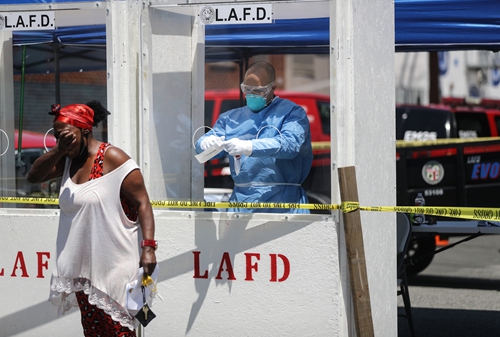
A black woman is asked to cough into her arm as part of testing for COVID-19, by a member of the Los Angeles Fire Department wearing personal protective equipment in Skid Row, amid the coronavirus pandemic on Tuesday in Los Angeles, California. Photo: AFP
Recent research has shown racial minorities, especially African Americans, bear a higher infection rate of COVID-19 than white people, which experts said reflects the deep racial inequality in US society.
Data from the US show there are differences in the infection rate among different racial and ethnic groups. In New York City there is a significantly higher infection noted among Latinos and African Americans, Professor Wafaa El-Sadr at the Epidemiology and Medicine at Columbia University, told the Global Times on Monday.
The difference in infection rates may be due to several reasons, she said. It might be due to the fact that such individuals are more likely to be exposed to cases of COVID-19 through use of mass transit or due to living in more crowded conditions with higher risk of transmission among household members.
A recent report by Brookings Institution, a US non-profit research institute based in Washington D.C, also indicates that blacks in about every US state with racial data available have higher contraction rates and higher COVID-19 death rates.
The report analyzed pre-existing health conditions are contributing to racial disparities in COVID-19 as Dr. Anthony Fauci, director of the US National Institute of Allergy and Infectious Disease since 1984, said health disparities have always existed for the African American community and the coronavirus shines a bright light on how unacceptable that is. Dr. Fauci declared that such health disparities should be addressed in the African American community.
Racism produced segregated neighborhoods with fewer hospitals, higher rates of chronic illnesses, and unequal access to health care, according to Center for American Progress (CAP), a public policy research and advocacy organization headquartered in Washington D.C.
"In Louisiana, blacks account for 70 percent of the deaths but 33 percent of the population. In Alabama, they account for 44 percent of the deaths and 26 percent of the population," according to a New York Times opinion piece published in mid-April.
People of color also harbor more concern about the pandemic.
According to Pew Research Center report in March, 46% of black people and 39% of Hispanics view the coronavirus as a major threat to their own health, compared with 21% of white adults.
As of Tuesday, almost 800,000 people in the US have been confirmed withCOVID-19, accounting for one third of the world's total. More than 42,000 have died from the virus.
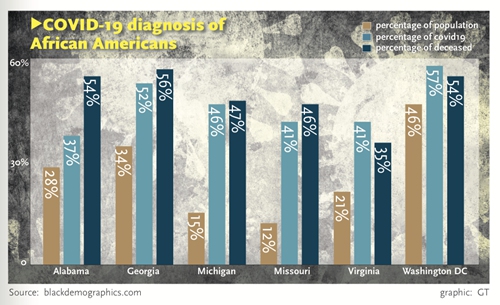
Graphic: GT
Negligence and violence
Healthcare for the black community has long been sidelined in the US going back to slavery. "It's not just negligence. It's also violence," said Danny Haiphong, a writer for Black Agenda Report. For minorities, "protecting yourself from the coronavirus becomes a threat to your very existence."
Much of the black community "live in crowded areas in urban areas around the country and have to work multiple jobs and live with multiple people to meet their needs for food, housing, and healthcare," said Haiphong, adding that "many black Americans work in low wage service sector jobs and have the least employee-friendly health insurance programs."
In the US, less than 30 percent of workers can work from home. According to the Economic Policy Institute, less than 20 percent of black Americans can telework, as compared to just less than 30 percent of whites. African Americans make much of the workforce deemed essential. "They're being hit hard because they cannot quarantine. They cannot shelter in place," said Haiphong.
Haiphong also works as a social worker in New York, one of the global epicenters of the pandemic, where Governor Andrew Cuomo is seeking to cut Medicaid in the state by $400 million. Such cuts would "ensure many New Yorkers, especially poor, disproportionally black, are unable to receive care. There are so many problems with cutting Medicaid, especially when the coronavirus proves that New York state's health system is unprepared for a crisis."
Haiphong noted discrimination is a rampant factor in health disparities, referencing the death of a 56-year old black man in Detroit where blacks have died at a higher rate than whites. "The man was denied three times at three different hospitals before dying at home," he said. Since the 1980s, the US has pursued policies that weaken hospitals serving working class black and Latino communities.
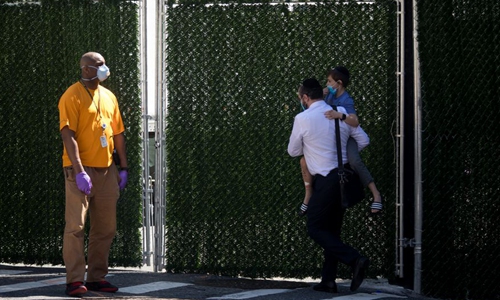
People are seen in front of a makeshift morgue in New York, the United States, April 6, 2020. Photo:Xinhua
This deregulation of the healthcare industry exists alongside inequalities that have lingered for centuries. Harvard Chan School Dean Michelle A. Williams cited a 2016 study published in the Proceedings of the National Academy of Science which found that most medical students believe blacks do not feel pain the same way whites do, a pseudoscientific notion dating back to slavery.
"There's a deep suspicion and justified suspicious of the healthcare system," said Haiphong, adding that "the complete and utter denial of black health by white supremacy is a huge reason why black people find themselves in a very precarious situation. For black people, whatever affects the entire working class, affects them twice as worse."
"There is this historical trend of the US and Western imperialists to see black Americans and Africans generally as subjects rather than human beings that have basic human rights that should be respected," said Haiphong, citing the Tuskegee syphilis experiment and the recent suggestions from French doctors that the COVID-19 vaccine should be tested on Africans.
Intentionally predicament
The long-running racial problem in the US society reflects the US' impotent institution, Professor Gerald Early from the African and African American Studies Department at Washington University in St. Louis, was quoted by the People's Daily as saying.
Early explained that although physical racial segregation has been lifted, the segregation in public consciousness still lingers.
In many US cities, white and African Americans live in different communities, and the latter are usually confined to inadequate living conditions. Local government do not collect enough taxes, so they don't have money to build good schools and public hospitals, thus a vicious cycle of poverty formed in African American communities. However, US politics is in the middle of an unprecedented division and has lost the ability to reach consensus on major social issues, not to mention take decisive measures to break the cycle.
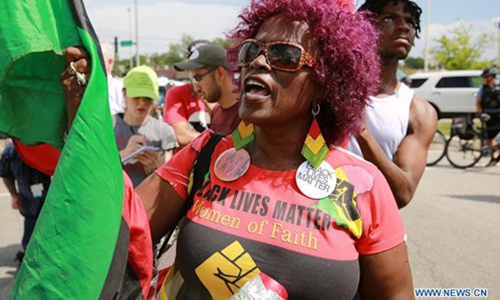
A protester calls for more attention to gun violence in African American community during a protest in Chicago, the United States, on September 3, 2018. Photo: Xinhua
"Most African American didn't catch the trend of the US' counter urbanization, in which rich people moved to suburbs with better living conditions, while most African American communities are downtown in densely populated areas," Bai Yuguang, a research fellow of the Institute of American Studies of the Chinese Academy of Social Sciences, told the Global Times.
CPA said in its report Systematic Inequality that the median wealth of African Americans in 2016 was $13,460 less than 10 percent of the $142,180 median white wealth. The average wealth of African American community was 11 percent that of whites and the best-case scenario for the past 30 years occurred when African Americans had about one-sixth the median wealth of whites in 1998. While higher education and increased income offer some benefits, African Americans are still unable to close the wealth gap.
The black-white wealth gap is a product of intentional systematic policy choices. The only way to correct this wrong is to make intentional systematic changes in response, according to CAP.
Prioritize politics
"The US government overlooked the severity of the pandemic and failed to alert the people before the virus spread in the country," said Bai.
Li Haidong, a professor at the Institute of International Relations of the China Foreign Affairs University, echoed Bai's opinion by saying the US federal government performed poorly in fighting against the COVID-19 pandemic. "The US leaders didn't foresee a large breakout of the pandemic and failed to increase public awareness to prevent the pandemic," he said.
"US President Donald Trump prioritizes his re-election and political career rather than the people's health, and when each US state struggled to fight against the pandemic, he was focusing on passing the buck to others such as media, the Democratic Party, and China," Li said. He suggested the US government fight against the COVID-19 pandemic scientifically instead of politically.
Christopher DeMuth, a Distinguished Fellow of Hudson Institute, believes that persistent racial discrimination and increasing hate crimes reflects that democracy has been facing a crisis in the country, according to People's Daily.
The division in US politics is because the US congress entrusted a large number of professional responsibilities to some administrative institutions and the congress simply votes to pass or decline bills. However, these administrative institutions have been controlled by institutions that represent a certain group of people's interests, and the legal terms are stipulated on the basis of insider trading, which are deemed "bad laws" in the eyes of the public.
Opinions from the elite level influence national policies while appeals for the public interest are buried in bureaucracy, according to DeMuth.
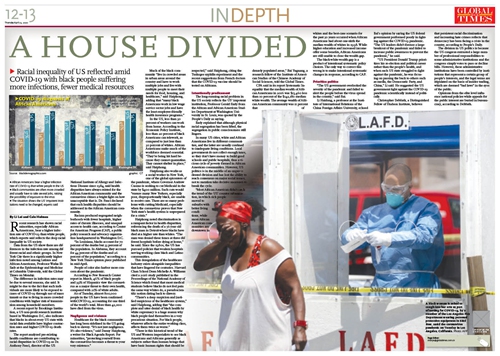
GT